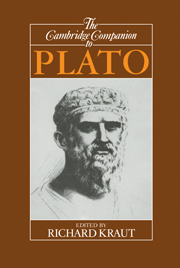Book contents
- Frontmatter
- 1 Introduction to the study of Plato
- 2 Plato
- 3 Stylometry and chronology
- 4 Socrates and the early dialogues
- 5 Mathematical method and philosophical truth
- 6 Inquiry in the Meno
- 7 Plato and Greek religion
- 8 Platonic love
- 9 Plato's metaphysical epistemology
- 10 The defense of justice in Plato's Republic
- 11 Plato on poetic creativity
- 12 Good-bye to the Third Man
- 13 Plato's Sophist on false statements
- 14 Disintegration and restoration
- 15 Plato's later political thought
- Bibliography
- Index
8 - Platonic love
Published online by Cambridge University Press: 28 May 2006
- Frontmatter
- 1 Introduction to the study of Plato
- 2 Plato
- 3 Stylometry and chronology
- 4 Socrates and the early dialogues
- 5 Mathematical method and philosophical truth
- 6 Inquiry in the Meno
- 7 Plato and Greek religion
- 8 Platonic love
- 9 Plato's metaphysical epistemology
- 10 The defense of justice in Plato's Republic
- 11 Plato on poetic creativity
- 12 Good-bye to the Third Man
- 13 Plato's Sophist on false statements
- 14 Disintegration and restoration
- 15 Plato's later political thought
- Bibliography
- Index
Summary
Plato does not have a comprehensive theory of love. Rather, he diverts certain received opinions about love to his own peculiarly philosophic ends. He is not interested in telling us what it would be like to live with someone as a platonic lover. Or so I shall argue, from a reading of the Symposium and the Phaedrus. I shall ignore the social regulations for sexuality proposed in the Republic (III 402d-403c, V 459-461) and the Laws (VIII 835c-842a) as not directly relevant to what has most fascinated Plato's readers about his approach to love, and is the topic of this essay: namely, the bridge he constructs between love and philosophy. I shall also ignore the potentially relevant discussion of friendship (against the background of a love affair) in that subtle and complex dialogue, the Lysis, in order to leave room to stretch myself to something worthwhile on the Symposium and Phaedrus. Of these two works, I shall focus on the former, for it alone among the dialogues is concerned exclusively with love.
- Type
- Chapter
- Information
- The Cambridge Companion to Plato , pp. 248 - 276Publisher: Cambridge University PressPrint publication year: 1992
- 16
- Cited by

